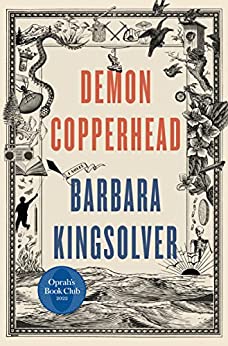Date: 25 June 2023
Location: Bob & Linda
I enjoyed Barbara Kingsolver’s book even though I’m not particularly fond of the subject. I had stronger reactions to this story than I have ever had to any of her other books, even while I found this book both depressing and fabulous to read. In the course of reading it, I had to quit several times, and read a lighter book, one than didn’t pull at my emotions with so much force. And it pulled at different emotions: sadness, pity, anger, happiness. What a roller coaster ride! I wanted to cuddle, shake, fuss at, and love this boy, not to mention just throw him against a very hard rock to see if I could get his attention.
“Anyone will tell you the born of this world are marked from the get-out, win or lose.”
This is the story of a boy born to an alcoholic teenage mother in a single-wide trailer in western Virginia. He has no assets beyond his dead father’s good looks and copper colored hair, a caustic wit and a fierce talent for survival. The story is told in his voice, that according to my daughter was too much that of a grown woman. I didn’t notice that perspective until she mentioned that it was her greatest disappointment in this Pulitzer Prize winning book.
Demon is a survivor in spite of all the strikes against him. The perils include no parents from the age of 5, a horrible foster care system which results in child labor, but no care, readily available drugs and bad schools with incredibly poor instructors, with a few notable exceptions. The roller coaster of his life reflects a place where he is invisible in a popular culture where even the superheroes have abandoned rural people in favor of cities – more votes per square mile.
American novelist Barbara Kingsolver became the first writer to win the Women’s prize for fiction twice. She stated in an interview in June 2023 with Lisa Allardice, “Rural people are so angry they want to blow up the system.” Her purpose in writing this book was to demonstrate their anger and from whence it came. She used Charles Dickens’ David Copperfield as her model for writing Demon.
Per Allardice, Kingsolver’s “Appalachian DNA is stamped on every one of the 550 pages of her bravura retelling of Dickens’s David Copperfield, relocated to her native state and updated to the 1990s. Largely written during the pandemic, its subject is another epidemic: the opioid crisis, of which Appalachia was ‘ground zero’. With its deep-rooted evocation of place, epic scope and powerful moral purpose, Demon Copperhead is undoubtedly the defining novel of an already distinguished career.”
For years she had been thinking of this big story she wanted to write “but that nobody wanted to hear”, not just about the prescription drugs crisis, but the generations of exploitation and institutional poverty, the plundering of the region for timber, coal and tobacco leading up to it. ‘Then Purdue Pharma targeting us saying, “OK, the last thing that we can make money off is the pain and the disability of the people who were injured in the previous industries’’ she says. But I had no idea how I could make this a story that people wanted to read. It was like a house that I was just walking around trying to find the doorway in.”
Kingsolver states that she found the inspiration she needed while staying in a B&B in Kent, England, Dickens’ house! While sitting at Dickens’ desk where he wrote Copperfield, she felt that she heard him saying write the story from the child’s point of view. After reading a copy of David Copperfield on the plane on the way home, she felt that “she had attended a masterclass on all the tricks he had used to make the Victorians face the poverty of these orphans”. She returned home and set up a spread sheet of Dickens’ 64 chapters and found contemporary examples of his horrors. She’d found her “way into writing about the ‘lost boys’ of Appalachia, where 40% of children are raised by someone else, either because their parents are dead, in prison or too incapacitated by addiction.”
I have promised myself that I will read David Copperfield and look for the examples stated in Allardice’s book review. But I have to forget the depression first.
*I realize that I haven’t reflected any of the groups’ comments, only because I couldn’t hear them while my hearing aids weren’t aiding. Sorry.
— Gina
